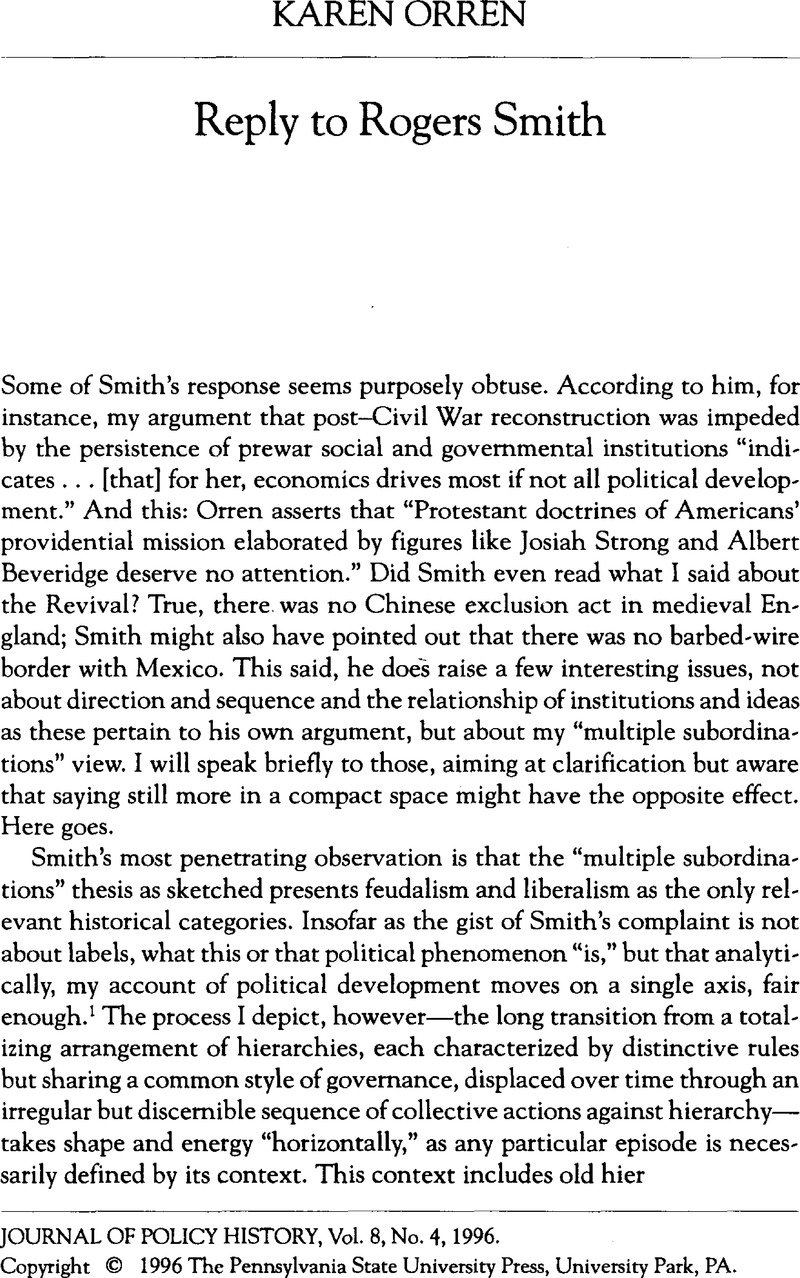No CrossRef data available.
Article contents
Reply to Rogers Smith
Published online by Cambridge University Press: 14 October 2011
Abstract

- Type
- Forum
- Information
- Copyright
- Copyright © The Pennsylvania State University, University Park, PA. 1996
References
Notes
1. To be distinguished, however, from Smith's overreaching on the point. I concluded my earlier comment: “If one were asked to reduce American liberal culture to a single principle of momentum, it would be resistance to established hierarchy. For new situations, inspiration might well be sought in other directions.” Smith transposes these words as Orren's “insisting … that the ‘single principle of momentum’ of American political culture is ‘resistance to established hierarchy,’” a posture Smith deems “peculiar” and potentially supportive of “dangerous complacency.” In any case, he says, it is a conclusion my “meager evidence” has not “earned.” See note 1 in my comment above on the occasion for this affront to natural justice.
2. Orren, Karen, “The Union Officer Before and After the Wagner Act,” Industrial Relations Research Association, Proceedings (forthcoming), 1996.Google Scholar
3. See Orren, Karen, “A War Between Officers: The Enforcement of Slavery Law in the Northern United States” (Part 1), Annual Meeting of the Social Science History Association, 1993, 37 pp.Google Scholar; and (Part 2): “Habeas Corpus,” Annual Meeting of the Law and Society Association, 1994, 57 pp.
4. See Britton, ed. Nichols, F. M. (1865), vol. 1, 197Google Scholar; SirSmith, Thomas, De Republica Anglorum, ed. Dewar, Mary (1982), 135–36Google Scholar; SirPollock, Frederick and Maitland, Frederic William, The History of English Law Before the Time of Edward I, vol. 1 (1968)Google Scholar, chap. 2, sec. 2. See also Maitland, F. W., Domesday Book and Beyond (1960), 47–61Google Scholar; and Dockes, Pierre, Medieval Slavery and Liberation (1982), 238–39.Google Scholar
5. Pollock, and Maitland, , History of English Law, vol. 1, chap. 2, secs. 6 and 7Google Scholar. See also Williams, Robert A., “The Algebra of Federal Indian Law: The Hard Trail of Decolonizing and Americanizing the White Man's Indian Jurisprudence,” Wisconsin Law Review 1986 (1986), 219–99Google Scholar; and Bush, Jonathan A., “‘You're Gonna Miss Me When I'm Gone’: Early Modem Common Law Discourse and the Case of the Jews,” Wisconsin Law Review 1993 (1993): 1225–85.Google Scholar




